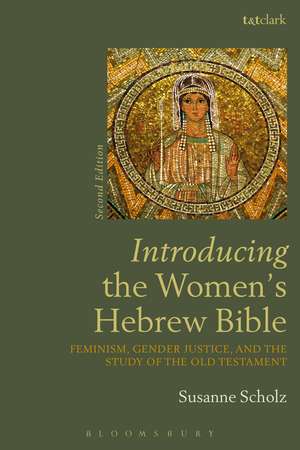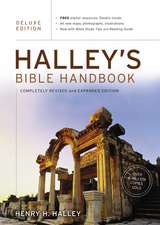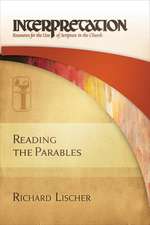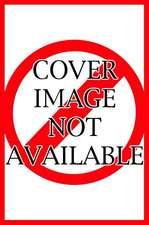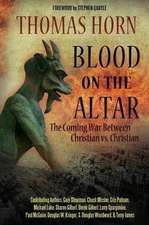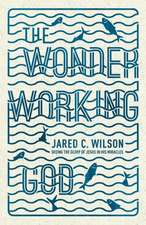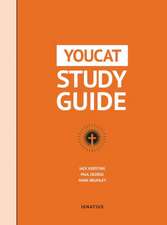Introducing the Women's Hebrew Bible: Feminism, Gender Justice, and the Study of the Old Testament
Autor Susanne Scholzen Limba Engleză Paperback – 9 aug 2017
| Toate formatele și edițiile | Preț | Express |
|---|---|---|
| Paperback (2) | 134.95 lei 6-8 săpt. | |
| Bloomsbury Publishing – 9 aug 2017 | 134.95 lei 6-8 săpt. | |
| Bloomsbury Publishing – 31 aug 2007 | 215.88 lei 6-8 săpt. | |
| Hardback (1) | 498.33 lei 6-8 săpt. | |
| Bloomsbury Publishing – 9 aug 2017 | 498.33 lei 6-8 săpt. |
Preț: 134.95 lei
Preț vechi: 173.54 lei
-22% Nou
Puncte Express: 202
Preț estimativ în valută:
25.82€ • 27.61$ • 21.53£
25.82€ • 27.61$ • 21.53£
Carte tipărită la comandă
Livrare economică 17 aprilie-01 mai
Preluare comenzi: 021 569.72.76
Specificații
ISBN-13: 9780567663368
ISBN-10: 0567663361
Pagini: 224
Dimensiuni: 156 x 234 mm
Greutate: 0.39 kg
Ediția:2
Editura: Bloomsbury Publishing
Colecția T&T Clark
Locul publicării:London, United Kingdom
ISBN-10: 0567663361
Pagini: 224
Dimensiuni: 156 x 234 mm
Greutate: 0.39 kg
Ediția:2
Editura: Bloomsbury Publishing
Colecția T&T Clark
Locul publicării:London, United Kingdom
Caracteristici
Reviews and challenges traditional interpretation of the Hebrew Bible through innovative study techniques, including case study review, anecdotal evidence, and international perspectives
Notă biografică
Susanne Scholz is Professor of Old Testament at Perkins School of Theology at Southern Methodist University in Dallas, Texas, USA. She holds a Ph.D. in Old Testament from Union Theological Seminary in the City of New York, USA. She has published widely on the intersection of feminist, religion, and the Bible.
Cuprins
PrefaceIntroduction1. From the "Woman's Bible" to the "Women's Bible": The History of Feminist Approaches to the Hebrew Bible 2. A Career As a Feminist Biblical Scholar: Four Stories 3. Gendering the Hebrew Bible: Methodological Considerations 4. Rape, Enslavement and Marriage: Sexual Violence in the Hebrew Bible5. Ruth, Jezebel and Rahab As "Other" Women: Integrating Postcolonial Perspectives6. Denaturalizing the Gender Binary: Queer and Masculinity Studies as Integral to Feminist Biblical Hermeneutics7. Essentializing "Woman": Three Neoliberal Strategies in Christian Right's Interpretations on Women in the Bible8. ConclusionsBibliographyIndex of ReferencesIndex of Authors
Recenzii
[A] stimulating, thought-provoking, and passionate sample of current and past scholarly voices by an author who clearly cares and who, by pointing to the androcentric aspects of the Bible, reminds readers that the personal is indeed the political.
Significant and essential update and expansion: in the first edition, Scholz authoritatively established the parameters of the discipline of feminist Hebrew Bible scholarship, its history, methodologies, hermeneutics and founding mothers. In this revised edition, Scholz expands and comments on the rise of neoliberal, conservative publications on women in the Bible, as well as on queer and masculinity studies. Scholz shows the reader an exciting and vibrant field, and whets the appetite for the next ten years to find out where feminist readings of the Hebrew Bible will take us.
Expanded to include masculinity studies, intersectional studies, and publications of the Christian right, Scholz's new edition offers a lively overview of the history of feminist biblical scholarship and sets the agenda for its future. Balancing broad overviews with case studies, this volume belongs not only in undergraduate and graduate classrooms but also the hands of readers seeking to understand why and how feminist (still) matters.
For those who thought that the last word had been said on feminist biblical exegesis as well as for those who have never heard the first word, this Introduction will prove invaluable. It serves the new reader as a comprehensive point of entry and the returning reader as a means to refresh and update one' s sense of the field, and to both it makes uncompromisingly clear what is at stake in the feminist exegetical endeavour. Covering as it does important theoretical questions and including biographical sketches of significant feminist exegetes, this newly updated edition demonstrates that despite the interpretative gains made over the last four or more decades of feminist biblical scholarship, there is no room for complacency. The need to address questions of gender and power as they are played out in biblical interpretation is as urgent as it ever was, and Scholz shows both why this is the case and how it might be done. Read this book and lose your exegetical innocence!
Significant and essential update and expansion: in the first edition, Scholz authoritatively established the parameters of the discipline of feminist Hebrew Bible scholarship, its history, methodologies, hermeneutics and founding mothers. In this revised edition, Scholz expands and comments on the rise of neoliberal, conservative publications on women in the Bible, as well as on queer and masculinity studies. Scholz shows the reader an exciting and vibrant field, and whets the appetite for the next ten years to find out where feminist readings of the Hebrew Bible will take us.
Expanded to include masculinity studies, intersectional studies, and publications of the Christian right, Scholz's new edition offers a lively overview of the history of feminist biblical scholarship and sets the agenda for its future. Balancing broad overviews with case studies, this volume belongs not only in undergraduate and graduate classrooms but also the hands of readers seeking to understand why and how feminist (still) matters.
For those who thought that the last word had been said on feminist biblical exegesis as well as for those who have never heard the first word, this Introduction will prove invaluable. It serves the new reader as a comprehensive point of entry and the returning reader as a means to refresh and update one' s sense of the field, and to both it makes uncompromisingly clear what is at stake in the feminist exegetical endeavour. Covering as it does important theoretical questions and including biographical sketches of significant feminist exegetes, this newly updated edition demonstrates that despite the interpretative gains made over the last four or more decades of feminist biblical scholarship, there is no room for complacency. The need to address questions of gender and power as they are played out in biblical interpretation is as urgent as it ever was, and Scholz shows both why this is the case and how it might be done. Read this book and lose your exegetical innocence!
